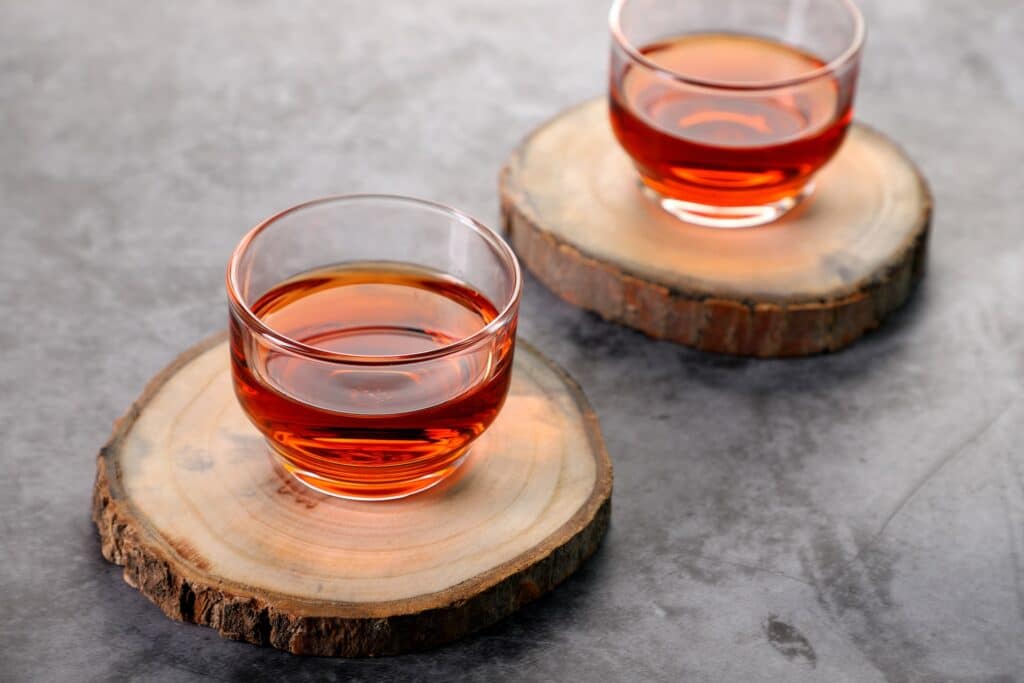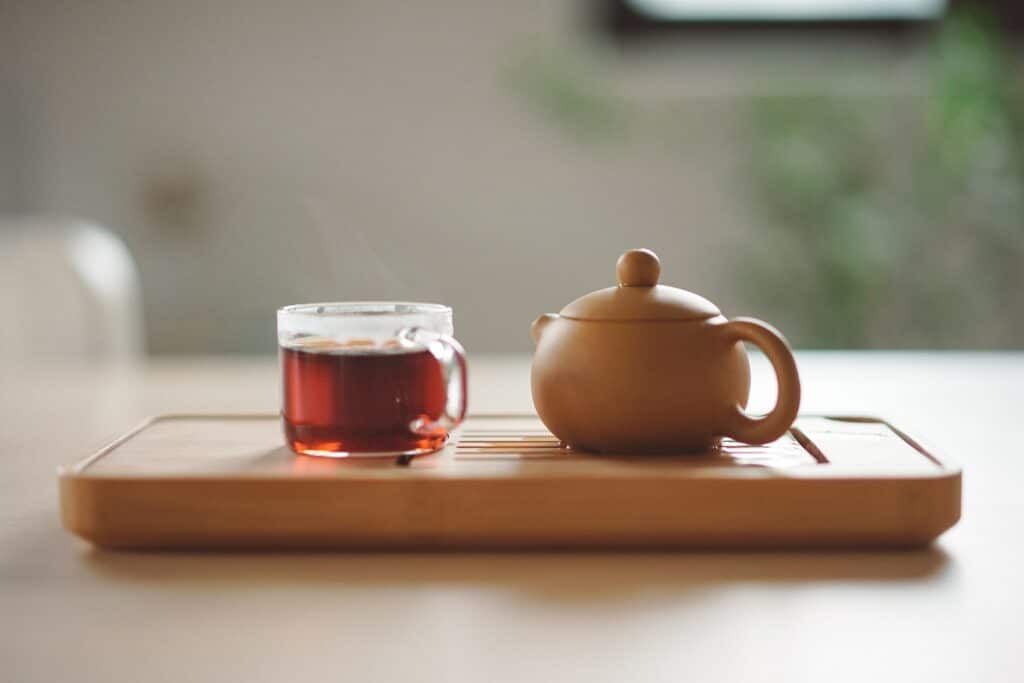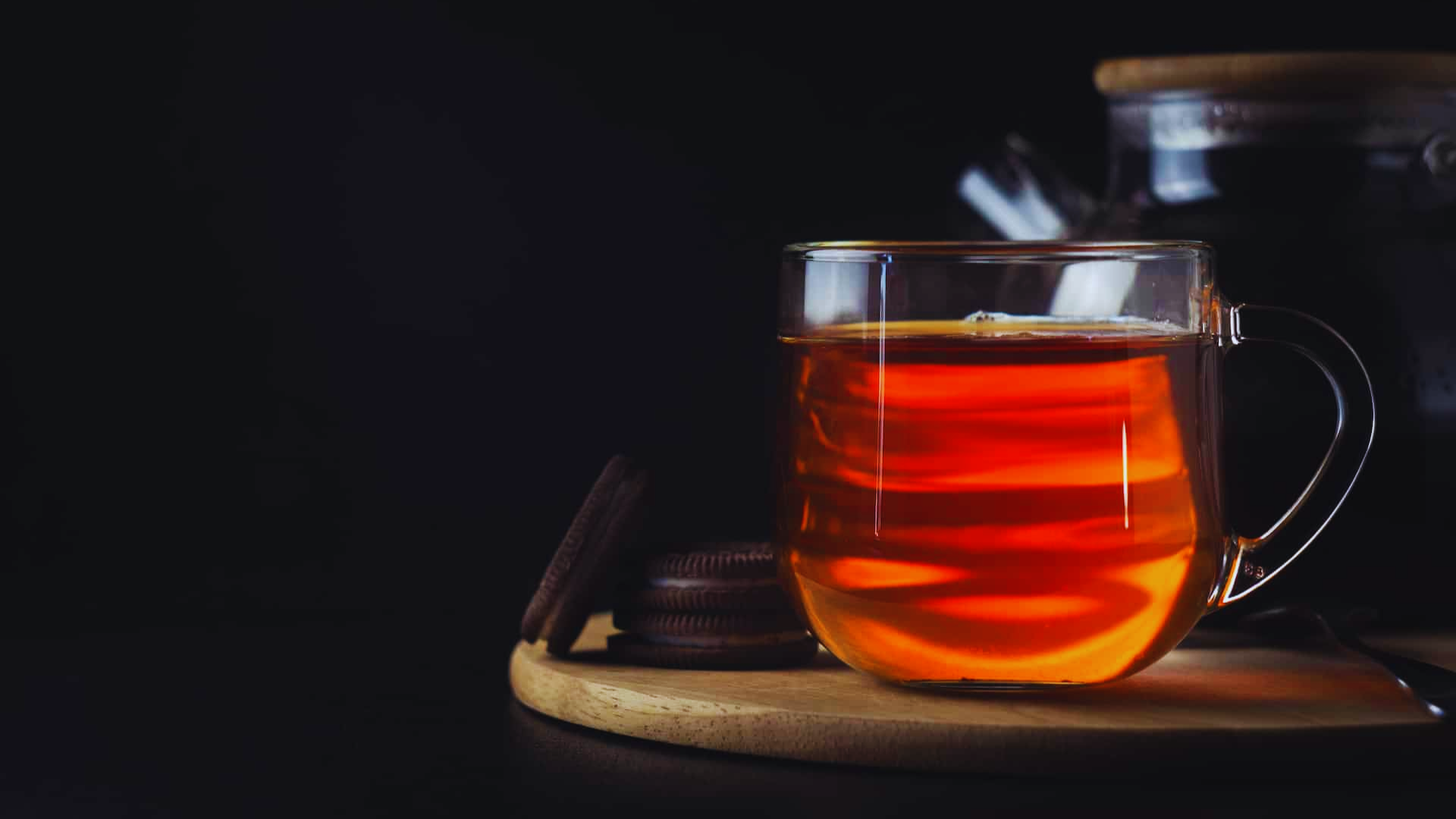Millions of people around the globe enjoy black tea, which has a rich history spanning centuries and cultures. The Camellia sinensis plant is the source of black tea.
The oxidation that results from rolling and withering tea leaves gives black tea its bold, robust, and strong flavor. This gives it a dark brown color and a distinctive flavor profile.
Black tea can taste earthy, malty, citrusy, caramel-like, leathery, fruity, smoky, nutty, brisk, or metallic, depending on the variety and quality of the tea. Some black teas also have subtle natural sweetness or fruity notes.
This article will explore the unique components that give black tea its distinct taste, such as theaflavins, catechins, and caffeine. We’ll also examine the sweet, complex, and bold flavors of certain varieties. Additionally, we’ll discuss black tea’s best food pairings and the different regions that grow it.
The Bold and Strong Taste of Black Tea
Black tea’s defining characteristic is its bold and strong taste, which has a robust and full-bodied flavor. This is in contrast to green and white teas, which also come from the same tea plant (Camellia sinensis) but are less oxidized versions.
For example, green tea tastes more creamy, while white tea tastes sweeter and fruitier. However, over-brewing teas can cause bitterness and astringency. Additionally, the taste varies depending on the number of tea leaves used, the water temperature, and the brewing time.
The degree of oxidation and processing, which determine the tea’s origin and cultivar, also have an impact on the taste of black tea. Theaflavins, catechins, and caffeine are the primary components that affect black tea’s taste.
Theaflavins contribute to black tea’s bold and rich taste, as well as its color, aroma, and flavor. The amount of theaflavins in black tea increases as it undergoes more oxidation. Catechins cause the mostly grey-black tea to be astringent and bitter.
Meanwhile, caffeine provides black tea with a stimulating effect, with less caffeine than coffee but still giving a mild energy boost. Black tea can also have different amounts of caffeine depending on how you make it and what type of tea you use.
English Breakfast, Irish Breakfast, and Scottish Breakfast are black tea blends that highlight the bold and strong taste of black tea. Typically made with Assam black tea, they result in a malty and robust flavor.

What Makes Black Tea Taste Unique?
Black tea is a complex drink because it has many different parts that affect how it tastes. These components include theaflavins, catechins, and caffeine, which are unique to tea leaves. Theaflavins make black teas taste strong and bold, and catechins give them astringency and bitterness. Black tea also has caffeine, which can add to its stimulating effects.
The type of tea used can also change the way black tea tastes. Darjeeling black tea has a delicate and floral taste, while Assam black tea has a malty and strong taste. Chinese black tea, such as Keemun, has a smoky and fruity taste, and African black tea, such as Kenyan black tea, has a bright and brisk taste.
The Sweetness and Complexity of Black Tea
While black tea is known for its bold, robust taste, it can also have sweet and complex flavors. These flavors can include notes of caramel, honey, and fruit. Black tea can taste sweeter if it is brewed at a lower temperature for a longer time. Additionally, the type of black tea being used can also influence its complexity. For instance, Darjeeling black tea has a floral and musky taste, while Yunnan black tea has a smooth and malty flavor.
To bring out the sweetness and complexity of black tea, the brewing method and steeping time are also crucial factors. Underbrewing may give off a weak and watery flavor, while over-brewing can produce a bitter and astringent flavor. To get the desired taste, it is crucial to strike the ideal balance between brewing time and water temperature.
Pairing Black Tea with Food
Black tea is a versatile beverage that can be paired with a wide variety of foods. The flavor and aroma of black tea can complement and enhance the flavors of various dishes. Here are some ways in which black tea can be paired with food:
- Sweet treats. Black tea complements chocolate, cakes, and pastries. Its tannins cut through the sweetness of the desserts, providing a refreshing balance. Also, the tea’s earthy and malty flavors can enhance the richness of the desserts.
- Savory dishes. Black tea pairs well with spicy curries, roasted meats, and rich stews. Its strong and bold flavors contrast with the bold flavors of the dishes, providing a refreshing balance.
- Cheese. Black tea goes well with a variety of cheeses. Its tannins cut through the fatty richness of the cheese, while its earthy flavors complement the nutty and creamy flavors of different cheeses.
- Fruits. Black tea pairs well with tart or citrus fruits. Its astringent qualities bring out the sweetness and acidity of the fruits, creating a refreshing and balanced pairing.
- Spices. Black tea complements various spices, especially those with warm and earthy flavors like cinnamon, ginger, and cardamom. Its bold and rich flavors enhance the spices, creating a warming and comforting pairing.
- Salty snacks. Black tea goes well with nuts, crackers, and popcorn. Its astringent qualities cut through the saltiness, while its rich and malty flavors provide a satisfying balance.
- Breakfast foods. Black breakfast teas complement eggs, bacon, and toast. The bold and robust flavors enhance the hearty and savory flavors of breakfast dishes, providing a refreshing and invigorating pairing.
Overall, the possibilities for pairing black tea with food are endless. The key is to experiment with different flavors and textures to find the perfect combination that suits your taste preferences.

Black Tea Varieties Around the World
Various regions around the world produce black tea, each with its own unique taste profile. Let’s explore some of the most popular black tea varieties from different regions:
China
Tea has its origins in China, and the country boasts several black tea varieties, such as Keemun, Lapsang Souchong, and Yunnan. Keemun tea has a mellow and fruity taste, while Lapsang Souchong’s smoky flavor comes from its drying process over pine wood fires. Yunnan black tea has a sweet, malty flavor and is full-bodied.
India
India is the leading producer and consumer of black tea globally, with a tea industry dating back to the 1800s. Assam and Darjeeling are two popular black tea varieties from India. Assam tea has a strong and malty flavor, making it a favorite ingredient for masala chai blends. On the other hand, Darjeeling tea’s delicate taste has floral and fruity notes.
Sri Lanka
Sri Lanka, formerly known as Ceylon, is another significant producer of black tea. Its tea industry started in the late 1800s, and today, the country is famous for high-quality black tea varieties like Ceylon black tea and Nuwara Eliya. Ceylon tea has a robust taste with a hint of citrusy flavor, whereas Nuwara Eliya tea has a delicate and floral taste.
Africa
Several African countries, such as Kenya, Malawi, and Tanzania, cultivate black tea. The bold and robust taste of Kenyan tea makes it a preferred ingredient for breakfast tea blends, while Malawi tea’s slightly sweet taste is commonly used in iced tea blends. Tanzanian tea, known for its strong and full-bodied taste, is another popular variety.
Overall, black tea is a versatile and complex beverage with a wide range of taste profiles. Exploring the different black tea varieties from around the world can be an exciting and delicious journey for tea enthusiasts.
Brewing Methods for Black Tea
People can brew black tea in several ways, such as using loose-leaf tea, tea bags, or a French press. The brewing method used can affect the taste of black tea significantly. For instance, loose-leaf tea can provide a more full-bodied taste as the leaves can expand fully.
Tea bags are more convenient, but the leaves are more broken and can provide a weaker taste. Using a French press can create a stronger taste as it allows the leaves to infuse fully. It is essential to choose the right brewing method depending on the desired taste.
The optimal brewing temperature for black tea is around 195–205 degrees Fahrenheit. Steeping time can also affect the taste. If you steep black tea for too long, it will taste bitter. Conversely, if you steep it for too little time, the flavor will be weak. For the best flavor, steep black tea for 3-5 minutes. The exact time will depend on the type of black tea, your own taste, and the way you make the tea.
Health Benefits of Black Tea
Black tea is high in antioxidants, which are essential for neutralizing free radicals in the body. As a bonus, it may improve heart health and thus lower the risk of cardiovascular diseases like heart disease and stroke. Drinking black tea regularly as an herbal tea may also reduce blood sugar levels, aid digestion, and boost the immune system.
The taste of black tea can also vary depending on the health benefits you seek. For example, adding lemon to black tea can give it more antioxidants, and adding honey can boost the immune system. However, sugar and cream in black tea may negate its health benefits.
Black Tea Cocktails and Mocktails
Black tea is a versatile ingredient that you can use in both alcoholic and non-alcoholic beverages. Some popular black tea cocktails include the Black Tea Bourbon Sour, the Black Tea and Gin Fizz, and the Spiked Black Tea with Rum. Non-alcoholic black tea beverages like the Iced Black Tea Lemonade or the Spiced Chai Latte are perfect for those looking for a caffeine boost without alcohol.
When selecting the right type of black tea for a light beer, cocktail, or mocktail, it is important to choose a flavor that complements the other ingredients. For instance, a fruity black tea may pair well with citrus juices in a cocktail, while a spiced black tea may pair well with vanilla or ginger in a mocktail.
The Role of Water in the Taste of Black Tea
The quality and temperature of the water used to brew black tea can significantly affect its taste. Hard water with a high mineral content can create a metallic taste, while soft water may result in a weak flavor. The ideal water for brewing sweet tea is fresh, cold water with a neutral pH balance.
Adding additional ingredients to the water, such as milk or honey, can also impact the taste of black tea. For instance, adding milk can create a creamier taste, while adding honey can provide a sweeter taste. It is essential to note that adding milk or honey may alter the potential health benefits of black tea.

Black Tea Blends and Flavors
The market offers a vast array of black tea blends and flavors, each with its unique taste profile. For example, Earl Grey is a black tea that has bergamot oil added to it to give it a citrusy and floral scent. Chai tea, on the other hand, is a spiced black tea that often contains cinnamon, cardamom, and ginger. This contributes to its bold and spicy taste. Darjeeling tea, which comes from the Darjeeling region of India, is a black tea with a light floral taste and a hint of astringency.
When selecting black tea blends or flavors, one must consider personal taste preferences. While some people may prefer more robust flavors, others may prefer a lighter, more delicate taste. Also, different blends and flavors may go better with some foods or work better with certain brewing methods. For example, chai tea may be better for a latte or iced black tea taste, while Darjeeling tea may be better for a hot cup of tea.
Final Thoughts
In conclusion, black tea’s taste is multifaceted, and various factors can influence it. By understanding the different components of black tea and how they interact with one another, along with experimenting with brewing methods and different blends and flavors, it’s possible to enjoy black tea’s unique taste to the fullest. The sweetness and bitterness of black tea, coupled with its different flavor notes, make it a versatile and enjoyable beverage that can be paired with a range of foods.
We hope this article has helped you understand the taste of black tea better and has encouraged you to try different black tea varieties and brewing methods. Whether you prefer your black tea bold and strong or sweet and complex, there is a black tea out there for everyone. So dive into the world of black tea and find the perfect cup for you.
Check out: What Does Chaga Tea Taste Like?
Sources
- https://artfultea.com/blogs/tea-wisdom/what-does-black-tea-taste-like
- https://expertofhome.com/what-does-black-tea-taste-like/
- https://www.thespruceeats.com/ceylon-tea-sri-lankan-tea-765685
- https://coffeeandteacorner.com/what-black-tea-tastes-like/
- https://coffeeandteacorner.com/what-green-tea-tastes-like/
- https://eatdelights.com/black-tea-taste/

